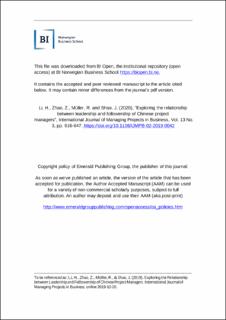| dc.contributor.author | Li, Haoran (DUT) | |
| dc.contributor.author | Zhao, Zhenzhi | |
| dc.contributor.author | Müller, Ralf Josef | |
| dc.contributor.author | Shao, Jingting | |
| dc.date.accessioned | 2021-05-10T12:20:15Z | |
| dc.date.available | 2021-05-10T12:20:15Z | |
| dc.date.created | 2020-01-13T10:46:48Z | |
| dc.date.issued | 2019 | |
| dc.identifier.citation | International Journal of Managing Projects in Business, Vol. 13 No. 3, pp. 616-647 | en_US |
| dc.identifier.issn | 1753-8378 | |
| dc.identifier.uri | https://hdl.handle.net/11250/2754684 | |
| dc.description.abstract | Purpose – Followership is the free will recognition of leadership in the commitment towards realization of the collectively adopted organization vision and culture. The purpose of this paper is to identify the relationship between project managers’ leadership and their followership. Most project managers are both leaders and followers at the same time, but research typically investigates only their leadership. This ignores followership as an important aspect in understanding and predicting behavior, and further in the selection of project managers.
Design/methodology/approach – The method used for this paper is explanatory and a deductive, through which the above research hypothesis is tested using quantitative techniques. Data are collected through a nation-wide survey in China. Data analysis is done through Factor Analysis, Canonical Correlation Analysis and Multiple Regression Analysis.
Findings – The results show that transformational leadership is positively correlated with transformational followership and transactional followership, and that transactional leadership is negatively correlated with transactional followership.
Research limitations/implications – The paper supports a deeper investigation into leadership and followership theories. A model for both leadership and followership is developed. The findings from this paper will help organizations in choosing their project managers.
Originality/value – The originality lies in the new way to examine the relationship between leadership and followership. It is the first study of this type on project managers. Its value lies in a new perspective towards the relationship between leadership and followership in project management. | en_US |
| dc.language.iso | eng | en_US |
| dc.publisher | Emerald | en_US |
| dc.subject | Leadership | en_US |
| dc.title | Exploring the relationship between leadership and followership of Chinese project managers | en_US |
| dc.type | Journal article | en_US |
| dc.type | Peer reviewed | en_US |
| dc.description.version | acceptedVersion | en_US |
| dc.source.pagenumber | 616-647 | en_US |
| dc.source.volume | 13 | en_US |
| dc.source.journal | International Journal of Managing Projects in Business | en_US |
| dc.source.issue | 3 | en_US |
| dc.identifier.doi | 10.1108/IJMPB-02-2019-0042 | |
| dc.identifier.cristin | 1771184 | |
| cristin.unitcode | 158,4,0,0 | |
| cristin.unitname | Institutt for ledelse og organisasjon | |
| cristin.ispublished | true | |
| cristin.fulltext | postprint | |
| cristin.qualitycode | 1 | |
